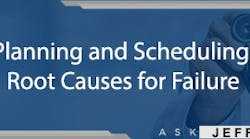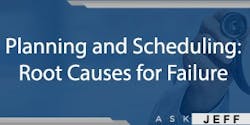Deelip, consultant, India
Answer: Even with companies that have implemented maintenance planning and scheduling, we find that only about 10% of the planner-schedulers are utilized effectively. Planning and scheduling work incorporates foundational blocking and tackling activities for work execution. On average, each hour spent on planning eliminates three to five hours of execution through the elimination of avoidable delays.
There are many reasons for the failure of implementations. Interestingly, more than 70% of all implementations fail regardless of the concept, whether it's a total productive maintenance (TPM) initiative, a root cause analysis (RCA) effort, or some other effort. In my experience, there are some common root causes.
Failure of management to actively support the planning and scheduling function. This can take the shape of improper hiring, verbalizing support but not following it up with supportive action, not prioritizing or ineffectively prioritizing activities, not adequately funding the effort, or failing to foster site partnerships (see below).
Lack of training and follow-on coaching – This takes the form of limited or no training for the function, no training for interfacing roles such as maintenance or operations supervisors and crafts, and/or no coaching to validate learning and remove obstacles that prevent effective planning and scheduling. A three-day training class is only part of the solution; follow-on coaching is where the rubber meets the road.
The constant rotation of personnel in positions – This can be seen in management or in hourly positions due to turnover or promotion. I see some organizations that have constantly revolving doors with people leaving, replacements coming in, and then these new additions leaving.
Lack of partnerships–It's incorrect to assume that reliability is a maintenance issue. We all must be heading in the same direction – this includes engineering, procurement, storeroom, production, quality, and management. We have to eliminate silos or islands where everyone is marching to a different drummer with different goals and measures.
These common issues drive ineffective planning and scheduling, but worse, they stymie development of a proactive, reliability-centered culture. Reactivity often prevails in these environments.
As a group, what other causes do you see undermining or preventing effective planning and scheduling? Please post your comments so everyone can all learn.
Talk soon,
Jeff Shiver, CMRP
If you have problems in the fields of maintenance, reliability, planning and scheduling, MRO storerooms, or leadership as examples, please contact Jeff Shiver with your question(s) here.


